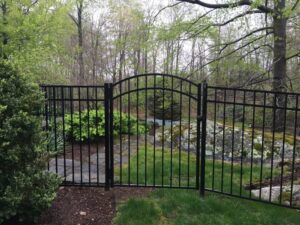As the seasons change, the needs of your fence evolve as well. To ensure your fence remains both visually appealing and functional throughout the year, it’s essential to perform seasonal maintenance. Different weather conditions from season to season can have varying impacts on different types of fences, so understanding and addressing these specific care requirements is crucial.
Wood Fences:
Spring Renewal:
Spring marks the ideal time to breathe new life into your wood fence. Begin by thoroughly inspecting loose boards, nails, or any signs of wear and tear. Replace any damaged components promptly.
As moisture can be detrimental to wood, especially with the freeze-thaw cycles that occur in many regions, it’s essential to address potential vulnerabilities. Apply a fresh coat of sealant or paint to protect your fence against moisture. This enhances the fence’s aesthetics and safeguards its structural integrity.
Summer Sun Protection:
In the summer months, your wood fence is exposed to intense sunlight. This exposure can lead to fading and peeling of paint or stain. To counteract this, consider reapplying a UV-resistant finish to protect the wood from the sun’s harmful rays.
Fall Preparations:
Before winter arrives, take measures to prevent potential damage. Trim any nearby trees or branches that could fall and damage your fence during winter storms. Leaves and debris can also accumulate around your fence, so be sure to clear them away.
Winter Watch:
During snowy conditions, removing snow buildup on your wood fence is essential to prevent warping or damage. Avoid using salt or ice melt products near the fence, as these can be damaging to the wood. Instead, focus on regular snow removal and gentle clearing.
Vinyl Fences:
Spring Cleanup:
Vinyl fences are known for their low maintenance requirements, but they can accumulate dirt and algae over time. To keep your vinyl fence looking its best, clean it with a mild detergent and water. This process will not only remove grime but also prevent the development of mold or mildew. While cleaning, inspect for any cracks or loose pieces and secure them as needed.
Summer Care:
During the summer, vinyl fences can expand and contract with temperature fluctuations. Ensure that your fence has adequate shade, especially during the hottest parts of the day, to prevent warping. Also, when removing snow in winter, take care not to scratch the vinyl material with snow removal tools.
Fall Maintenance:
Clear away leaves and debris that can accumulate around your vinyl fence to maintain its cleanliness. Ensure that any gates are secure and functioning correctly.
Winter Protection:
In snowy regions, gently remove snow from your vinyl fence to prevent overloading. Be cautious with snow removal tools to avoid scratching or cracking the vinyl.
Aluminum Fences:
Spring Freshening:
Aluminum fences are known for their durability and resistance to corrosion. Nevertheless, washing them with soapy water in the spring is wise to remove any dirt or grime that may have accumulated over the winter. Check for rust spots and address them promptly. If you are in a coastal environment, where salt-laden air can have a corrosive effect over time, it’s worth noting this potential issue.
Summer Maintenance:
Aluminum fences can get hot to the touch in the summer sun. Keep them clean to maintain their appearance and consider applying a heat-reflective coating to reduce heat absorption.
Fall Precautions:
Inspect your aluminum fence for any loose or damaged sections. Clear away debris from the fence to prevent buildup during winter.
Winter Vigilance:
During winter, ice buildup can affect gates and latches. Be attentive and clean these areas to ensure smooth operation, especially after freezing rain or snowstorms.
Chain-Link Fences:
Spring Checks:
In the spring, inspect the chain-link mesh for any signs of damage or rust caused by heavy rain or humidity. Repair or replace damaged sections promptly. Lubricate the gate hinges to ensure smooth operation. Chain-link fences can also be affected by strong winds, which may result in bending or even toppling fence sections. Sturdy posts and secure anchoring can help prevent these issues.
Summer Resilience:
Chain-link fences generally require less maintenance during the summer, but it’s a good practice to check for rust spots, especially in areas with coastal environments where salt-laden air is prevalent.
Fall Preparations:
As fall approaches, continue to monitor the condition of your chain-link fence and make necessary repairs. Clear debris away from the fence to prevent it from piling up during winter storms.
Winter Care:
During winter, regularly inspect your chain-link fence for ice accumulation, particularly around gates. Proper maintenance in the winter months ensures that your fence remains resilient in the face of harsh weather conditions.
By following these comprehensive seasonal care tips for your wood, vinyl, aluminum, or chain-link fence, you can extend its lifespan and maintain its aesthetic appeal throughout the year. Remember that regular inspections and timely repairs are crucial to ensuring your fence serves its purpose effectively and continues to enhance the beauty and functionality of your property.
If you have any specific questions or require professional assistance with fence maintenance, don’t hesitate to reach out to Young’s Fencing for expert guidance and service.






